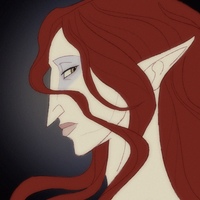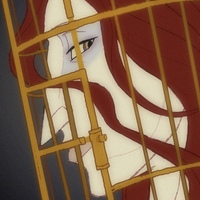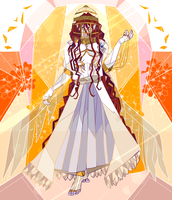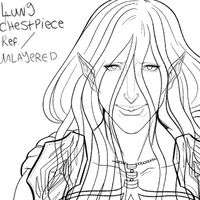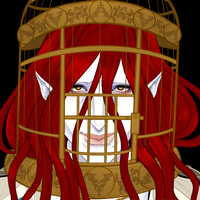Ninian, of the Order of Song
Kleptoparasitism
- Created
- 8 months, 12 hours ago
- Creator
- Kleptoparasitism
- Favorites
- 1
Basic Info
-
Basic
-
Name: Ninian — Age: 25 — Gender: Male — Height: 6’4 —
-
Personality
-
Ninian is calm, never raising his voice or lashing out. He seems unbothered by rudeness or brutality, much to the infuriation of any detractors. He often acts as if he truly knows what’s best, even if he is an outsider to an issue. His desire for penitence can lead him to trying to solve issues he has no hand in, leading him to many adventures both good and bad. He can seem a bit handwaving, dismissive, but it’s because he has seen so much he is disconnected from smaller troubles and the weight they can have. He gives off a cold, calculating appearance with very, very dry humor - he can’t really help it.
-
Backstory
-
Ninian comes from a commune of Elves in the montane forest region of Imrion (Or an elven-adjacent race if in a generalized fantasy setting) that is known for their wealth, beauty and success. This status comes from their prolonged worship of the Gods of the Old World, but in particular that of God of Gluttony - the root of mortal sin. Gluttony, as a concept, is often attributed to excess of food; but to divorce it from just this idea, Gluttony (especially when viewed in the context of the 7 deadly sins) Is the root for which all other sins can flourish. Gluttony is simply the excess of all things, in this case; Hence, this commune in the montane forest of Imrion found worship that encompassed and surrounded the Old God of Gluttony - One that is called by many names, but primarily is termed “The Forbearer” but ritualistically, the Old God is also termed as “The Maw”. - specifically, this refers to the effigy temple. The Forbearer took sacrifices from the Imrion, both mortal and of their own crafted offerings, and in exchange, the Forbearer gave to the Imrion their “excess” - Excess food, wealth, prosperity, anything they could ever ask for was theirs as long as The Forbearer was worshipped. Ninian himself was born into the Imrion, with a naturally occurring sensitivity to the “higher frequency”, essentially magic. Because of this gift, as he aged, he began to display this sensitivity with more prominence as it became harder to ignore. This caught the attention of the Forbearer, who demanded that Ninian be sacrificed to him to satiate his desire to consume said magic, as well as the God’s internal desire to ensure the Imrion did not gain such power among their ranks regarding this rare birth amongst their commune
-
Backstory cont.
-
The sacrifices usually consisted of young adults, those who had undergone the ritual for adulthood and, on that yearly ceremony, a selected few were called out to by the Maw to be consumed by it for the good of their community. In Ninian’s case, when his natural proclivity to magic was discovered by the Forbearer, it called that Ninian be brought to the temple of the Maw, where he would be aged like wine for his magic, and self, to eventually be consumed. It is as such that Ninian was taken to The Maw, which was the term for the Forbearer’s effigy, a temple of flesh - a bottomless ruin in which all living things were consumed into the Forbearer’s unending hunger. (The Maw is the temple of the Forbearer itself; in this context, Old Gods cannot manifest physically for their own selves but they can create physical proxies in the form of effigies, temples, altars etc. that mortals can physically interact with and worship in some capacity. For the Forbearer, it’s effigy takes the form of a temple of flesh. To compare it to something else, it’s similar in concept to the “mystery flesh pit” in terms of the organic, biological structure. Its body horror, but as a temple, with a throat pit in the heart of it) Ninian spent his childhood to teenaged years within The Maw - at least 14 years until he was 21 - within the pulsing gore, kept imprisoned as the magic within him strengthened itself with every year he aged. This was seen as a holy, sacred act, and he was brought tributes by the other members of Imrion to his hold within the Maw’s temple - He was constantly told this was his sacred, incredible fate - and yet Ninian grew doubt, and fear, as the years grew by. He did not trust the care of Imrion as he was waited upon, because it was prepping a lamb for slaughter. His faith in the Forbearer grew less as the disparity he witnessed within Imrion’s society and social classes, and the torture he endured within the Maw’s temple, increased his compromised mental state and he began to turn against the teachings of Imrion, become more hostile to the preparations and tributes of the Imrion upon him within the Maw, and seek a way to escape becoming eaten by the Forbearer. Despite being raised into this belief structure, he came to understand how little Imrion really meant, and how the excess was destroying the people - to the point that these sacrifices were normalized, and seen as even honorable, because it was for the greater purpose of excess. (The purpose of the Maw is a direct metaphor for capitalistic structures and how divergent births, in Ninian’s case neurodivergence and transgender identity, are often mistreated in these structures - and if not exploited, are placed in a system not built to sustain
-
Backstory cont.
-
Before his ceremony at the age of 21 to be consumed by the Maw, after years of being held in “aging” to perfect his synchronicity with the higher frequency, by the Imrion, Ninian was able to use his magic to immolate the Maw’s flesh walls, scalding through enough that he could claw his way out - Escaping capture from the Imrion chancellor. Ninian believed he could, somehow, end the cycle of sacrifice altogether. However, in retaliation to this, Ninian would discover that the Forbearer took indiscriminate sacrifice from Imrion, and consumed over half of the commune as payment, to create an “equal exchange”. Ninian lives with this guilt - He was too afraid to die, yet this discovery, though he escaped for his own life, has led him on a path to atonement for the lives lost in Imrion - even though they had irreparably harmed him, he felt guilt for the harm done to his tormentors, even if they were no longer on the Earth. Ninian sought the path of penitence. Unable to move beyond his trauma, and this crushing guilt, Ninian longed for a world of peace. And that is where the Order of Song found him, in Aelessand.
-
Backstory cont.
-
Although Ninian has partaken in the Rite of Regalia, (the bird cage is a symbol of the priestesses/priests of the Order, representing a sense of self-sacrifice and loyalty. It is welded with magic around the head and cannot be easily removed without harming the wearer, and it is seemed as a sin to remove it.) He ascended to Priesthood and had partaken in the pulmonary fluid that gifted all who sing for the Order the nature of their voices, Ninian is on a personal quest for peace and, as the Mother Chord has guided him, he cannot use his voice until he has completed his penance. This is not a penance from the Mother Chord, or the First Breath itself, but rather a journey of absolving his own guilt after the massacre of Imrion by the Forbearer. After speaking his guilt at the deaths he blames his escape for, the Mother Chord said he could be freed from the Forbearer/The Maw’s influence, and find personal absolution, by saving his sacred voice and traveling to the statues of fallen priestesses who had gone in pilgrimage to spread the will of the Order of Song. By praying to these statues and enduring the pain of each priestess’s death for his own penance, and by spreading the will of the Order, Ninian may find inner absolution, and cleanse his connection to the Forbearer, and allow himself to use his sacred voice for the Order of Song.
-
About Order of Song
-
Order of Song uses the constant, unending singing of several magically imbibed priestesses (Ninian is their first priest); the songs of the chosen comfort and soothe all those who hear it, lulling them into security. Their songs reach out to every corner of the Aelessand domain, creating this “calm, peaceful life” where all can rest their burdens. The order of song is a following of the Old God named The First Breath, or The Primeval lung/breath to some - this God felt too strongly such sorrow and empathy for the burdens of mortals that it couldn’t bear to leave them, and remained on Earth to care for them - though it’s love is smothering of the natural chaos and change of the world. The First Breath seeks complete peace, at great heartache it feels toward mortals. When a follower has come of age and proven their devotion, a ritual is performed that fits a birdcage over the head of the follower; this cage is sealed and welded shut, and must never be removed, as it is a symbol of devotion to The Order of Song. It is meant to symbolize songbirds, with the promise that no voice shall be more important than the song. The cage is symbolic of a show of restraint, and birdcages themselves have historically been shown as representing the concept of freedom, or lack thereof. In the Order of Song, personal freedom is a tenant that is preached, as to make the Order appealing to those outcasted; the ritual of placing the birdcage about one’s head, whereas the head is what holds the personality (mind and eyes and voice) it is to show complete devotion to the Order of Song and prove that not only have you found your place among it, but that you have recognized the spirit of First Breath and the sanctity of one’s own voice, face, and mind.
-
Order of song cont.
-
The Priestesses of the Order specifically go another step with this ritual, shrouding the birdcage with cloth. This is reminiscent of the shrouds/veils placed over songbird cages to prevent them from singing, particularly at night. This shroud is meant to represent that their sacred voices cannot be halted, no matter adversity, and that their song shall continue regardless. It is a complete show of faith to the Order of Song, and the importance of these priestesses to the order itself, and the sanctity placed upon the voice, and by extension the head and face where the voice emits. (Covering the throat) Ninian does not wear the shroud due to his pilgrimage of penitence. Those chosen by the First Breath will sing endlessly for Aelessand, but may travel beyond it to spread the peace of the Order. A chosen priestess/priest will sing until they can no longer - when they die, their bodies become gold statues, which continue to sing beyond death.
-
Mother chord
-
the Mother Chord is the effigy of the First Breath, and serves as the High Priestess of the Order of Song. Her grace spreads to the entire Order, and through her, the First Breath’s will is known. This effigy takes the form of a golden temple, where inside she is a beautiful gold statue of a woman, in the center of the temple which is shaped like a larynx. Her legs are fused to this larynx; she is the temple and it’s functions herself. In the summer, a cool breath blows like gentle wind from within the temple; in the winter, it’s warm. Within the temple, past the opening of the Larynx, there is a pool of the Mother Chord’s pulmonary fluid, which has sacred properties, and is imbibed during the rites of Regalia.
